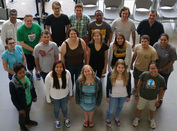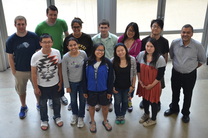See School is a National Award Winning Field School
|
To guard ourselves from bitterness, we need the vision to see in this generation’s ordeals the opportunity to transfigure both ourselves and American society. Our present suffering and our nonviolent struggle to be free may well offer to Western civilization the kind of spiritual dynamic so desperately needed for survival.... We must accept finite disappointment but we must never lose infinite hope. Only in this way shall we live without the fatigue of bitterness and the drain of resentment. This was the secret of the survival of our slave foreparents.
Dr. Martin Luther King Jr. |
|
The Buildings-Landscapes-Cultures field school is a unique curricular offering at the University of Wisconsin's Department of Architecture. It is a multi disciplinary setting where students, faculty, scholars and community members explore ways to see and interpret the city by engaging multiple urban stakeholders in storytelling, ecological conservation, heritage preservation and civic engagement. From Grace Lee Boggs we learnt that "We are the leaders we've been looking for" and our job at the BLC field school is to empower such leaders. At the BLC field school we are committed to seeing our world using the following four frames.
|
Buy 2012 and 2013 Field School Monographs
Wendel White is the Distinguished Professor of Art at Stockton University in his life-long state of New Jersey. He is the recipient of a Guggenheim Fellowship and multiple New Jersey State Council on the Arts Fellowships.
From www.thephotoshow.org |



